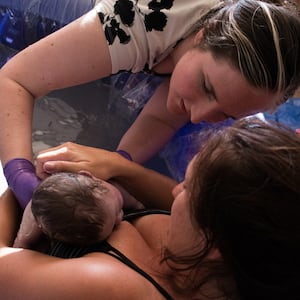For months, doctors and scientists have been frustrated by the lack of data on how COVID-19 affects pregnant people. But as the patient population grows, research on the subject is finally starting to emerge, and it doesn’t look good.
A recent, as-yet unpublished study from researchers in Spain found pregnant women with COVID-19 were twice as likely to experience a preterm birth and three times as likely to have their baby admitted to the neonatal ICU.
The study is the result of a collaboration between 76 hospitals from around Spain that came together in March to study the effects of COVID-19 on pregnancy. Forty-five hospitals participated in the current study, resulting in a patient population of 1,009 pregnant women. Of those, 246 tested positive for the coronavirus, though the vast majority were asymptomatic at delivery.
ADVERTISEMENT
Even without symptoms, the effects of COVID-19 on the pregnancies was significant: 13.8 percent of the infected women experienced a preterm delivery, compared to 6.7 percent of the healthy group. More than 9 percent of the infected mothers had their infants admitted to the neonatal intensive care unit, compared to 2.4 percent of the healthy group. While none of the mothers in the study died, COVID-19 infection also correlated with a higher rate of fetal death in utero.
“We know that pregnancy is a risky situation, not only for COVID,” said Oscar Martinez, an OB-GYN at the Hospital Universitario Puerta de Hierro in Madrid and the lead author on the study. “If you are a pregnant patient, you should be aware that if you get COVID, you have more chances than if you’re not pregnant of getting an intensive care unit admission, and that means that your baby has more chances to get into the neonatal intensive care unit.”
Martinez advised pregnant women to take precautions and make sure they get a flu shot. “We cannot face, at the same time, a COVID-19 pandemic and an influenza season with all of our intensive care units full,” he said.
The study has not yet been published or submitted for peer review, but Martinez said he and his fellow researchers wanted to release the results early because of the pressing need for information on how COVID affects pregnancy. Members of the group have already published a study on fetal heart rates in mothers with coronavirus and a research letter on the effects of delivery by cesarean section. They plan to submit the current study to a top-tier medical journal Thursday.
A review of 77 studies published Monday in the British Medical Journal drew similar conclusions, finding that pregnant women with COVID-19 are at increased risk of preterm delivery and having their babies admitted to the neonatal ICU, though that study also noted that the overall rates of preterm birth, stillbirth, and neonatal death were not high. This study also found an increased risk of admission to an intensive care unit or invasive ventilation in pregnant patients with COVID-19, indicating a “potential high risk in pregnancy.”
Martinez said researchers should further investigate the effects of the body’s immune response to COVID-19 on pregnancy, and on the possible effects of different blood types. His group has already analyzed almost 400 more deliveries since their study ended, and plan to publish two or three more articles on COVID-19 in pregnancy in the coming months.
“This is the only good news about having this many cases in Spain,” he said. “We keep recruiting patients and we keep recruiting controls.”






